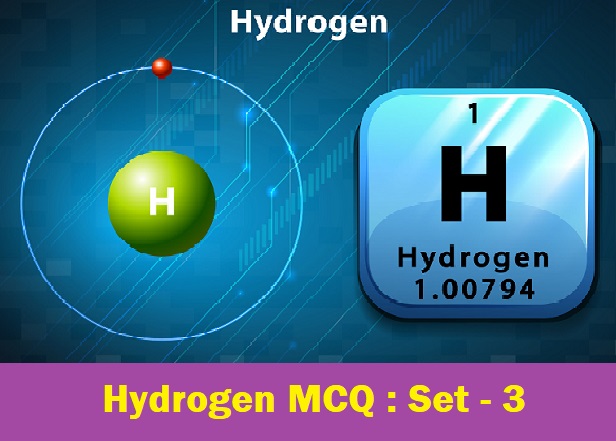CBSE Class 11 Chemistry Chapter 9 Hydrogen Multiple Choice Questions with Answers. MCQ Questions Class 11 Chemistry Hydrogen with Answers was Prepared Based on Latest Exam Pattern. Students can solve NCERT Class 11 Chemistry Hydrogen MCQs with Answers to know their preparation level.
Students who are searching for NCERT MCQ Questions for Class 11 Chemistry Hydrogen with Answers are compiled here to get good practice on all fundamentals. Know your preparation level on MCQ Questions for Class 11 Chemistry with Answers. You can also verify your answers from our provided MCQ Class 11 Chemistry Hydrogen with Answers. So, ace up your preparation with MCQ of Chapter 9 Chemistry Objective Questions.
MCQ Questions Class 11 Chemistry Hydrogen with Answers - Set - 3
Question 1:
Hydrogen is evolved by the action of cold dil. HNO3 on
(a) Fe
(b) Mn
(c) Cu
(d) Al
Correct Answer – (B)
Question 2 :
Which of the following is formed when zinc reacts with sodium hydroxide?
(a) Hydrogen gas
(b) Sodium zincate
(c) Zinc oxide
(d) Both (a) and (b)
Correct Answer – (D)
Question 3 :
Hydrogen molecules differs from chlorine molecule in the following respect
(a) Hydrogen molecule is non-polar but chlorine molecule is polar
(b) Hydrogen molecule is polar while chlorine molecule is non-polar
(c) Hydrogen molecule can form intermolecular hydrogen bonds but chlorine molecule does not
(d) Hydrogen molecule cannot participate in coordination bond formation but chlorine molecule can
Correct Answer – (D)
Question 4 :
Which one of the following is not an isotope of hydrogen ?
(a) Deuterium
(b) Tritium
(c) Ortho hydrogen
(d) None of these
Correct Answer – (C)
Question 5 :
Which of the following statements is correct ?
(a) Hydrogen has same IP as alkali metals
(b) Hydrogen has same electronegativity as halogens
(c) It has oxidation number of –1 and +1
(d) It will not be liberated at anode
Correct Answer – (C)
MCQ Questions Class 11 Chemistry Hydrogen with Answers
Question 6 :
Which of the following metal evolves hydrogen on reacting with cold dilute HNO3 ?
(a) Mg
(b) Al
(c) Fe
(d) Cu
Correct Answer – (A)
Question 7 :
Hydrogen bond energy is equal to :
(a) 3-7 cals
(b) 30-70 cals
(c) 3-10 kcals
(d) 30-70 kcals
Correct Answer – (C)
Question 8 :
Question. Following are some properties of hydrogen which of the following properties resemble with alkali metals and which with halogens
(i) Hydrogen lose one electron to form unipositive ions
(ii) Hydrogen gain one electron to form uninegative ions
(iii) Hydrogen forms oxides, halides and sulphides
(iv) Hydrogen has a very high ionization enthalpy
(v) Hydrogen forms a diatomic molecule, combines with elements to form hydrides and covalent compounds.
(a) Alkali metals resemble (i), (iii) and (iv) Halogens resemble (ii) and (v)
(b) Alkali metals resemble (i) and (iii) Halogens resemble (ii), (iii) and (v)
(c) Alkali metals resemble (i) and (iii) Halogens resemble (ii), (iv) and (v)
(d) Alkali metals resemble (i) only Halogens resemble (iv) and (v)
Correct Answer – (C)
Question 9 :
Why does H+ ion always get associated with other atoms or molecules?
(a) Ionisation enthalpy of hydrogen resembles that of alkali metals.
(b) Its reactivity is similar to halogens.
(c) It resembles both alkali metals and halogens.
(d) Loss of an electron from hydrogen atom results in a nucleus of very small size as compared to other atoms or ions. Due to small size it cannot exist free.
Correct Answer – (D)
Question 10 :
Hydrogen accepts an electron to form inert gas configuration. In this it resembles
(a) halogen
(b) alkali metals
(c) chalcogens
(d) alkaline earth metals
Correct Answer – (A)
- NCERT Solutions Class 11 Chemistry Chapter 1 : Some Basic Concepts of Chemistry
- NCERT Solutions Class 11 Chemistry Chapter 2 : Structure Of The Atom
- NCERT Solutions Class 11 Chemistry Chapter 3 : Classification of Elements and Periodicity in Properties
- NCERT Solutions Class 11 Chemistry Chapter 4 : Chemical Bonding and Molecular Structure
- NCERT Solutions Class 11 Chemistry Chapter 5 : States of Matter
- NCERT Solutions Class 11 Chemistry Chapter 6 : Thermodynamics
- NCERT Solutions Class 11 Chemistry Chapter 7 : Equilibrium
- NCERT Solutions Class 11 Chemistry Chapter 8 : Redox Reactions
- NCERT Solutions Class 11 Chemistry Chapter 9 : Hydrogen
- NCERT Solutions Class 11 Chemistry Chapter 10 : The s-Block Elements
- NCERT Solutions Class 11 Chemistry Chapter 11 : The p-Block Elements
- NCERT Solutions Class 11 Chemistry Chapter 12 : Organic Chemistry: Some Basic Principles and Techniques
- NCERT Solutions Class 11 Chemistry Chapter 13 : Hydrocarbons
- NCERT Solutions Class 11 Chemistry Chapter 14 : Environmental Chemistry



